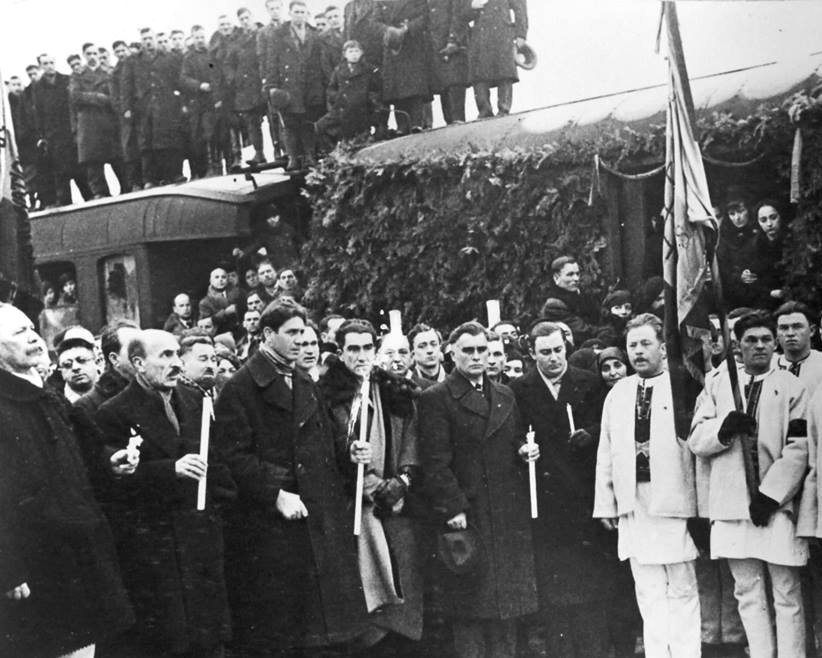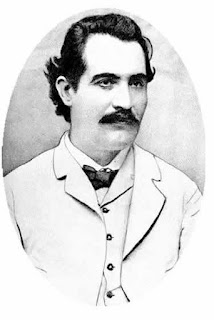A Brief Introduction to Mihai Eminescu
It is an intriguing physiognomy.
One might mistake him for a cross between a Southern Italian and a
Russian. He almost looks like an Eastern European Mussolini. As
with many of his countrymen, his features combine the “Latin” and the “Slavic”
looks.
To add to the exoticness of his
appearance, the mid-to-late 19th century Romanian poet and editorialist may
have had a bit of distant Armenian ancestry from two centuries before.
Armenian merchants had long ago travelled through the relatively cosmopolitan
port towns of Moldavia, where they were usually welcomed by the locals as much
more trustworthy alternatives to the economically aggressive Jewish merchants
who carried out the same economic functions. Another theory of where he
got his dark features, also consistent with the history of Moldavia, is that
his family tree included centuries-old Tatar origin. (The anti-Turkic man
himself preferred the Armenian theory.) More recently in his lineage, and
like many other Moldavians, he also had some Slavic blood.
North, south, east, and west all come
together in this strangely striking face, a face from the seat of the ancient
Getae. It is a face that has become more iconic for his countrymen than
it ever was for the author himself, whose ideal physical type was evidently
blonde and blue-eyed. This is the face of Mihai Eminescu, known in
Romania as the country’s national poet, but virtually unknown in the
English-speaking world.
Of peasant origin on his father’s side
and descended from Moldavian aristocrats on his mother’s side, Eminescu did not
put his inherited wealth to waste. Educated in the German language since
childhood, Eminescu was culturally, if not always geopolitically, an
enthusiastic Germanophile. As a young man, he studied in Vienna and in
Bismarck’s Prussia, where he learned Sanskrit and immersed himself in the
philosophy of Arthur Schopenhauer. He was also a student of Eugen
Dühring.
Eminescu had intellectual precedents in
his own country, but he often made radical departures from them. His
ideas were influenced by a leading conservative Romanian cultural circle called
Junimea, which originally reflected the interests of the old Moldavian boyar
class that had been displaced by the liberal bourgeoisie in the 19th
century. However, there are significant differences between Eminescu’s
philosophy and Junimism.
“The Junimists,” for example, “wanted
literature to be separated from politics; to remain l’art pour l’art,
with no social content desirable.”[1] Eminescu
rejected this doctrine. He has also been accurately described as “less of
an elitist” than the prototypical Junimist.[2] Another difference is that “Junimism was opposed to
anti-Semitism, considering it to be a barbarous affront to human intelligence.”[3] Although
Eminescu’s political and economic anti-Semitism was never unqualified and
rarely extreme, he did explicitly distrust what he regarded as undue Jewish
influence over his country.
One source
on this subject claims Eminescu “stood out as the most eloquent spokesman of
the radical anti-Semites.”[4] Eminescu
viewed this relatively recent immigrant population, by and large, as inherently
unpatriotic. He has been described
as a fierce opponent of Jewish civil equality, arguing that “they
presently constituted a danger to the Romanian nationality, when they did not
possess equality of rights. They
would be so much the more a peril once naturalized.” [5]
On the
other hand, he laid the ultimate blame on the liberal Romanian bourgeoisie, far
more than on other ethnicities, for Romania’s social problems. He also
hated the initially Ottoman-appointed Phanar, which had misruled his country’s principalities from the 18th
century to the early 19th century. This accounts for the seemingly anti-Christian themes in his
poetry, which should be seen as a form of protest against an institution he
felt had ruined the Orthodox Church, not an attack on the Christian religion as
such. His ethnic nationalism was synthesized with a Moldavian local
patriotism; Bucharest he regarded as having lost both its moral and its racial
character to immigrants and liberal decadence. One historian summarizes Eminescu’s views thus:
“Eminescu’s
goal — he defines it as his ‘supreme law’ — was the preservation of his country
and its ethnic identity… Consequently, the national interest must determine
every political, educational, and cultural decision. Thus, in Eminescu’s
eyes, what he called ‘American liberalism’ (or Western humanitarian values)
might imperil the uniqueness of the Romanian ethnic character, and should
therefore be rejected… He rejected the incomplete and superficial
Westernization of 1848. Eminescu recognized only two positive classes in
Romania: the nobility, and, above all, the peasantry. Any development
must be based on the peasant, and it must be an organic one… Eminescu was
closer to the peasants than to the boyars.” [6]
Eminescu’s editorials combine ethnic nationalism,
anti-liberalism, cultural traditionalism, authoritarian populism, and
antibourgeois economic paternalism. His poems deal with a wide variety of
topics, including philosophy, nature, love, death, fantasy, history, and
politics. While the rhythmic musicality of his poetry usually gets lost
in translation, the powerful brew of striking imagery and lucid ideas in his
work is easy to understand in all languages. And though the accusations
of humorlessness leveled at Eminescu are false, it is true that the hilarious
but hateful witticisms in his editorials do nothing to brighten his body of
work’s grim tone.
Writing from the 1870s to the early 1880s,
Eminescu spent the latter half of the 1880s in poor physical and mental
health. It has been widely theorized that his 1889 death came as a result
of either medical malpractice, foul play, or both. He was only 39 years
old.
Resources:
http://thelegionofmichael.blogspot.com/2017/09/old-icons-and-new-icons-1877-essay-by.html (essay translation)





Comments
Post a Comment